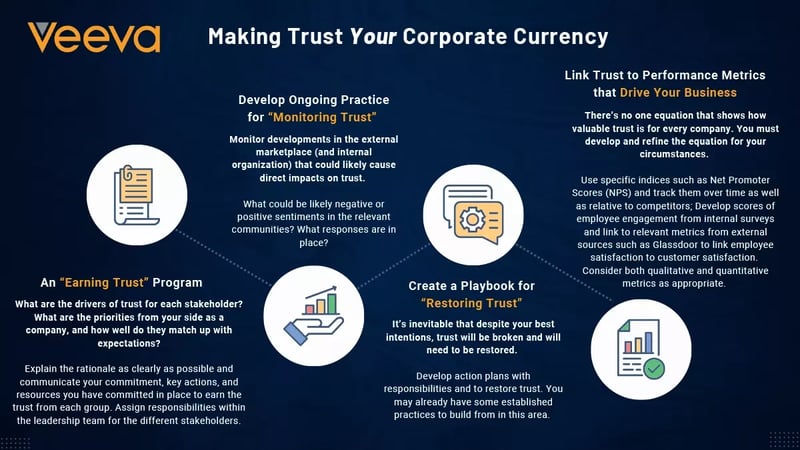Note: The blog below is a guest post by Dr. Venkat Venkatraman, David J. McGrath Jr. Professor in Management and Professor, Information Systems, at Boston University. Dr. Venkatraman researches and writes about how established companies recognize and respond to digital technologies.
If we pose the question: ‘What’s the currency of a business,” most would respond by saying it’s money.
Money—the financial resource—has been the single most important resource driving modern capitalistic enterprise. Shareholders commanded respect as they provided the financial capital that’s necessary to operate the business—make investments, run the business, and earn profits for those that provided the capital. Milton Friedman famously opined in an essay for the New York Times in 1970 that the “Social Responsibility of Business is to Increase its Profits.” Explicit in his essay was that managers should not worry about any other stakeholder. And for the past five decades, most—but not all—CEOs and corporations subscribed to the shareholder primacy doctrine. The implication was that the CEOs should mainly focus on earning and maintaining the trust of the capital market.
Over the last decade, various academic scholars and business institutions have recognized trust as the more definitive all-inclusive currency in business.
In August 2019, nearly two hundred CEOs of US corporations belonging to the Business Roundtable (BRT) publicly drafted a note of commitment to recognize a broader purpose of the corporation beyond shareholders to include suppliers, customers, employees, community (and society). What does such pronouncements mean in practice to how corporations operate? If the corporations truly do focus on all these different stakeholders, they cannot simply declare it in announcements and pronouncements. They must earn the trust of these different stakeholders through deeds, actions, involvement, and true commitment.
Dive deeper into this topic through our in-depth interactive report “Trust is the New Corporate Currency"
Trust in a company’s mission and purpose attracts customers, employees, and partners. Take the case of The Body Shop, which exists to “fight for a more beautiful world.” This purpose drives everything they do—"that business is a force for good, the empowerment of women and girls and the belief that everyone is beautiful.”
If the customers trust in this purpose, beyond just a slogan, they will gravitate towards their products; if potential employees trust that this purpose drives their culture, they will want to be part of it. And if suppliers trust this purpose, they will want to be associated with them. The Body Shop, started by Anita Roddick in 1976, may be a pioneer in this area. But many others, such as Patagonia and Ben & Jerry’s, share a similar values-driven approach.
This brings us to trust becoming the currency of business—not just for some corporations such as The Body Shop or Patagonia, or those corporations started by a newer generation of entrepreneurs. It’s becoming critical for corporations everywhere.
Digital Era Introduces Transparency and Distortion
In this digital era, light can be shined on anything that a company does. Traditional and informal media can scrutinize every major move by companies—where its plants are located, how its raw material is sourced, how green its buildings are, and the size of the corporate fleet’s carbon footprint. Social media amplifies and distorts actions taken by companies, internal memos get released to the public often without full contexts, and so on. Negative information and interpretations go viral without control. Proactive communication is met with (subdued) applause.
In the digital era, the stakeholders are not independent but interdependent. Easy access to information has given rise to a new form of activism worldwide. Incipient groups have emerged that are highly interested in how companies achieve success beyond their financial performance–the metric traditionally tracked by shareholders. A retailer’s customers, for example, might care deeply if it moves to cut costs by shifting manufacture of its products to a country that’s not known for protecting worker safety and rights. Or, a prospective employee might pass on an offer of employment if the recruiting company doesn’t convince them it’s operating in a modern, ethical, and sustainable way.
These examples may sound familiar. What’s notable today, though, is the scale at which these scenarios can occur. Good news or bad news can be amplified through social media at an unprecedented rate, resulting in swift reputational or financial impacts.
Trust as the Currency of Business
You have no doubt seen high-level pronouncements such as “trust is the new corporate currency.” And you likely wondered what exactly it means. Surveys routinely indicate that there’s a ‘trust gap’, and that business leaders overestimate trust that their stakeholders have in them.
To me, such a trust gap is not surprising, and it shouldn’t astonish you. It’s not shocking when surveys use general questions such as: “On a scale of 1-10, how much do you think your customers (or employees) trust your company? …How much do you trust companies in the following industries or trust your employer?” Such surveys then create proxies such as “Trust Index” or “Trust Scores” and develop leaderboards that array a set of companies (or industries) along them. They garner headlines, hardly actionable. Yet they cannot be ignored. Trust has become the new corporate buzzword—often used but rarely understood in the same way by many.
Trust is earned by being transparent about your company’s actions with the different stakeholders. If your leadership team accepts trust as a currency that has value across the set of five stakeholders—customers, suppliers, employees, society, and shareholders—it must put in place a systematic program to understand how this currency is valued by each stakeholder.
This starts with a recognition that the currency may well be different for the different stakeholders, and some may conflict with each other. For example, investment in enhancing trust with employees and suppliers may come at the expense of shareholder dividends; investments in local community programs and youth job-training may take resources away from some other stakeholders, and so on.
Recognizing limited resources but prioritizing in ways that reveal recognition of the importance of the different stakeholders in a transparent manner will go a long way in enhancing trust. And allow for the possibility that different stakeholders may emerge higher (or lower) in priority depending on circumstances and that there’s no predefined hierarchy.
Trust is lost by not being transparent with the stakeholders, and the effect can be long lasting. When Facebook failed to protect the privacy of 87 million users’ personal information in 2015, it not only went around data privacy regulations, it violated the public’s trust. Volkswagen continues to work on recuperating its image from the 2015 rigged-emissions revelations. And Wells Fargo has yet to recover from the damage wrought by its enormous 2016 fake-account scandal.
Beyond consumer and employee reputation, breaches of trust like these carry significant financial consequences. An Economist magazine analysis of companies like Volkswagen, Wells Fargo, and six other corporations that recently experienced a public breach of trust calculated that
“A company loses 30 percent of its value when it loses trust, at least in the short term. Meanwhile, a 10 percent increase in trust leads to 0.8 percent more economic growth.”
Making Trust Your Corporate Currency
To make trust your corporate currency, you must think through the following four essential elements to develop a systematic strategy and plan of action.

The corporations exist to deliver value to customers in an interdependent world with different stakeholders that bring complementary resources to the endeavor. And trust is the glue that connects the different stakeholders in this enterprise. They believe in the cause and expect that they will get a fair share of the value created by the enterprise.
Trust as a currency is different from money: it doesn’t have objective value, but its subjective value is significant. It doesn’t have trading exchanges, but it’s important to make business interactions work. It doesn’t have formal valuation rules but rules how the stakeholders are vested in the enterprise success.
Trust—which takes an inordinate amount of time and effort to build up—can break in an instant due to extraneous circumstances. But, a systematic approach to recognizing and managing risk as a currency will help minimize, mitigate, and manage the risks.
SHARE







